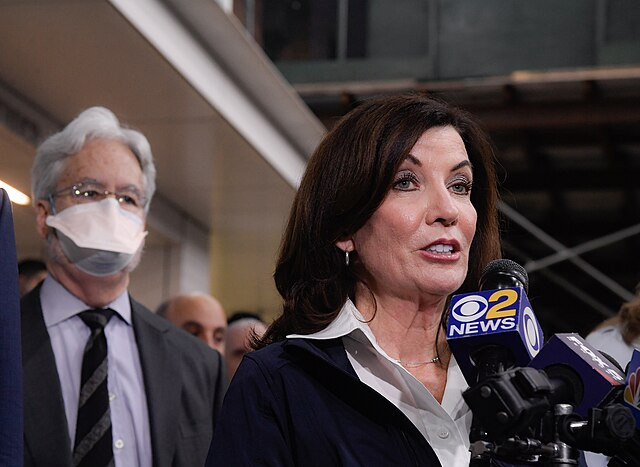New York Governor Kathy Hochul announced on Wednesday that she is indefinitely delaying the implementation of the controversial congestion pricing plan in Manhattan. This decision, made just weeks before the plan was set to take effect, marks a significant setback for transportation advocates who have spent decades pushing for the measure. The delay also represents a victory for opponents who argue that the toll would be a regressive tax on commuters.
"After careful consideration, I have come to the difficult decision that implementing the planned congestion system risks too many unintended consequences for New Yorkers at this time," Hochul said during a video briefing from her Manhattan office.
According to a source familiar with the Governor's decision, Hochul's hesitation stems from concerns about affordability and the potential negative impact on the city's post-pandemic economic recovery. The plan, which would have been the first of its kind in the United States, was scheduled to begin on June 30. It proposed charging drivers $15 to enter Manhattan south of 60th Street, with higher tolls for commercial vehicles and trucks.
The Metropolitan Transportation Authority (MTA), which approved the plan in March and was tasked with its implementation, declined to comment on the delay.
John Samuelsen, international president of the Transport Workers Union, accused Hochul of succumbing to political pressure. "This was going to be a disaster for Hochul at the ballot, and the plan is bleeding into the Dem's efforts to take back the House," Samuelsen told CNN.
The congestion pricing plan was intended to generate revenue for critical transportation upgrades and maintenance. Over the years, it would have helped improve New York City's aging subway system and enhance other public transit options. However, Hochul believes that implementing the plan now would deter commuters from returning to Manhattan's central business district.
The delay has drawn sharp criticism from various quarters. City Councilmember Joe Borelli, a Republican representing parts of Staten Island where the plan is unpopular, labeled the governor's decision as blatantly political. "The political calculus has always been the same - it was going to pay off poorly for Democrats," Borelli told CNN. "This has always been a wildly unpopular proposal supported by a very vocal minority in the city."
Several members of New York's congressional delegation also reacted quickly. Rep. Ritchie Torres, who represents parts of the Bronx, expressed surprise at the decision. Conversely, Rep. Jerry Nadler, a Democrat from Brooklyn, criticized the delay, calling it disappointing. "As a longtime champion of Congestion Pricing and the Congressional Representative of a significant portion of the Central Business District (CBD), I am disappointed by reports that Governor Hochul will not implement Congestion Pricing on June 30, as previously planned," Nadler said in a statement.
House Minority Leader Hakeem Jeffries, whose district covers southern Brooklyn, took a more nuanced stance. His spokesperson, Andy Eichar, stated that Jeffries supports a temporary pause to better understand the financial impact on working-class New Yorkers.
Transportation Alternatives, a key advocacy group supporting the plan, condemned the delay. "Delaying congestion pricing is a slap in the face to the millions of New Yorkers who rely on public transportation every day just to appease the program's loudest foes," the group said in a statement. "Congestion pricing is a $15 billion lifeline for the MTA - critical funding that will be lost if the program is stalled."
The plan faced fierce opposition not only from local politicians but also from prominent figures such as New Jersey Governor Phil Murphy and former President Donald Trump. In response to the delay, Nassau County Executive Bruce Blakeman voiced relief but also concern over potential substitute taxes. "I'm just happy it's now being put on hold. I hope it ends completely and that there isn't some sort of substitute tax," Blakeman told Fox News Digital.
The legal landscape surrounding the congestion pricing plan has also been contentious. Lawsuits brought by unionized public school teachers, politicians, and New Yorkers argued that the tolling scheme was approved without proper scrutiny by federal transportation officials. A federal court judge in Manhattan heard arguments in May, and similar challenges are pending in New Jersey courts.
Former New York Governor Andrew Cuomo, who initially urged a delay in the plan, reiterated his concerns in a March op-ed, emphasizing that New York City has not yet recovered from the pandemic. "New York City still hasn't recovered from COVID; office occupancy is still at only 48.9%," Cuomo wrote for the New York Post. "For many, traveling to the city is no longer a necessity - and for some, it is an unwelcome hardship."
Criticism also came from Cuomo's former deputy, Melissa DeRosa, who accused Hochul of making a transparently political move. "This is exactly why @GovKathyHochul is so wildly unpopular," DeRosa wrote on X, formerly known as Twitter. "Instead, like an ostrich, she & @MTA doubled down. Now this will be seen for exactly what it (and she) is: transparently political."






